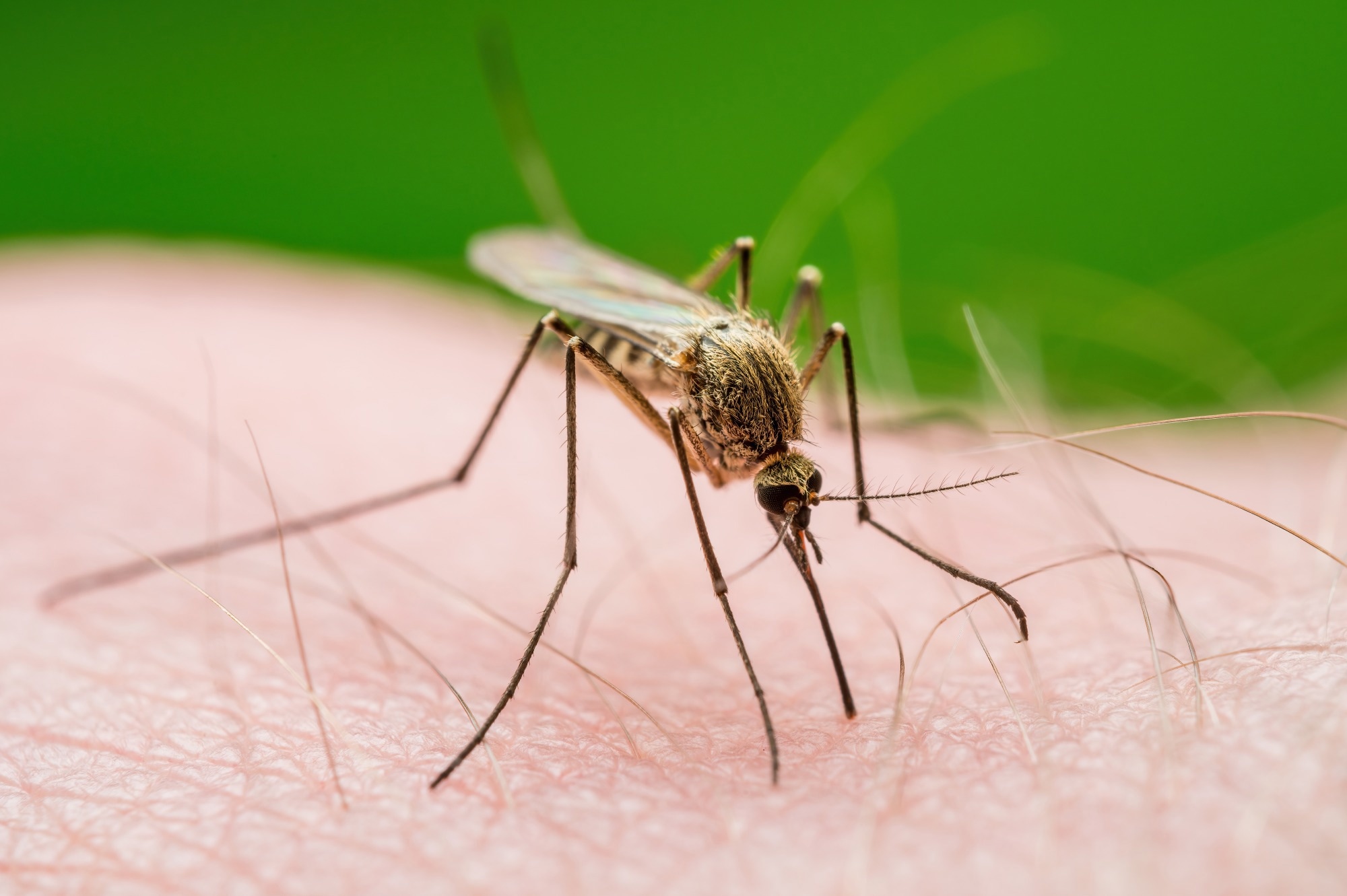Blood-feeding insects such as mosquitos have undergone various adaptations, such as using specific enzymes to efficiently access and consume blood and to evade their own immune and hemostatic responses.
In a recent study published in Nature Communications, a team of researchers from the United States investigated the role of the anti-hemostatic molecule salivary apyrase from the mosquito species Anopheles gambiae (AgApyrase) in hemostasis regulation in the blood meal and the transmission of the malarial parasite Plasmodium.
 Study: Mosquito salivary apyrase regulates blood meal hemostasis and facilitates malaria parasite transmission. Image Credit: nechaevkon/Shutterstock.com
Study: Mosquito salivary apyrase regulates blood meal hemostasis and facilitates malaria parasite transmission. Image Credit: nechaevkon/Shutterstock.com
Background
Malaria continues to be a global health problem, with the 2022 statistics reporting close to 250 million cases and over 600,000 deaths. It is caused by the parasite Plasmodium and is transmitted through the bite of the Anopheles mosquito.
The parasite undergoes the sexual reproduction cycle inside the mosquito, forming sporozoites that can infect humans through the mosquito bite. Arresting the parasite at this stage is the key target of most malaria treatments.
The human enzyme plasmin helps break down the blood clots formed by fibrinogen to stop bleeding. Plasmodium proteins, similar to plasmin, aid in the infection of humans and mosquitoes.
Recent research has shown that mosquito saliva also contains proteins that reduce clot formation and enhance fibrinolysis or the breakdown of blood clots, making it easier for Plasmodium to infect mosquitoes and humans.
Understanding the exact mechanisms through which these salivary proteins aid Plasmodium infections could help improve malaria treatment and prevention.
About the Study
In the present study, the researchers explored the mechanism through which salivary apyrase, ingested when the mosquito is feeding on blood, promotes the breaking down of blood clots and facilitates the infection of the mosquito by Plasmodium and its subsequent transmission to humans.
The study used various biochemical and analytical techniques to understand the influence of mosquito saliva on the human tissue plasminogen activator (tPA) and the fibrinolytic system.
The researchers first examined how the saliva and salivary gland extracts of Anopheles gambiae activate tPA, which is the protein that facilitates the breaking down of blood clots in humans.
A fluorogenic substrate was used to measure the activity of tPA when exposed to either the mosquito saliva or the salivary gland extracts. Subsequently, size-exclusion chromatography was used to fractionate the mosquito salivary proteins, and mass spectrometry was used to identify the potential tPA activators.
Since AGAP011026-PA, which is annotated as 5’ nucleotidase ecto or Ag5'NTE, was considered the most likely activator of tPA, the researchers conducted further experiments to test the role of Ag5'NTE in the fibrinolytic pathway. A colorimetric assay was performed to measure the induction of tPA based on Ag5'NTE levels.
Additionally, Ag5'NTE, which was renamed AgApyrase, was biochemically characterized to determine its enzymatic role using a phosphate release assay. The researchers also tested its ability to inhibit the in vitro aggregation of platelets using platelet aggregation assays.
Furthermore, enzyme-linked immunosorbent assay (ELISA) overlay assays were used to determine whether AgApyrase interacted directly with human tPA.
Biolayer interferometry and structural modeling were used to study the strength and the site of this interaction, respectively. The presence of AgApyrase in the midgut of the mosquito after a blood meal was tested using Western blotting and immunohistochemical methods.
Major Findings
The study found that mosquito saliva and the extracts from the salivary glands significantly enhanced the activity of tPA, facilitating the conversion of plasminogen to plasmin and increasing the breakdown of blood clots. Furthermore, AgApyrase was identified as the key tPA activator.
AgApyrase was found to hydrolyze adenosine triphosphate and adenosine diphosphate to adenosine monophosphate, preventing the aggregation of platelets and dissolving blood clots. In the midgut of the mosquitoes, AgApyrase was also found to enhance fibrinolysis, which was observed through the increased accumulation of fibrin degradation products.
These findings suggested that AgApyrase dissolved blood clots in the mosquito midgut, making the blood less viscous and aiding the motility and transmission of Plasmodium.
Additionally, AgApyrase also dampened the activation of neutrophils and the production of reactive oxygen species in the blood bolus in the midgut, and this reduction in immune responses further facilitated parasite transmission.
The administration of recombinant AgApyrase to Plasmodium berghei-infected mice resulted in an increase in Plasmodium oocyst formation in the mosquitoes that fed on the blood of the mice.
This confirmed the role of AgApyrase in enhancing the transmission of malarial parasites. Additionally, immunization of the mice against AgApyrase also reduced the oocyst numbers and the prevalence of infection, further confirming this finding.
Conclusions
In summary, the study reported that the protein AgApyrase in mosquito saliva played a central role in the breakdown of blood clots in the blood bolus and inhibited platelet formation.
The enzyme contributed substantially to enhancing the motility and transmission of the malarial parasite Plasmodium. Targeting AgApyrase could provide potential interventions against malaria and other mosquito-borne diseases.
Journal reference:
-
Pala, Z. R., Thiago, S., Minai, M., Crews, B., PatinoMartinez, E., CarmonaRivera, C., Paola, L., MartinMartin, I., FloresGarcia, Y., Cachau, R. E., Muslinkina, L., Gittis, Apostolos G, Srivastava, N., Garboczi, D. N., Alves, D. A., Kaplan, M. J., Fischer, E., Calvo, E., & VegaRodriguez, J. (2024). Mosquito salivary apyrase regulates blood meal hemostasis and facilitates malaria parasite transmission. Nature Communications. doi:10.1038/s41467024525023, https://www.nature.com/articles/s41467-024-52502-3